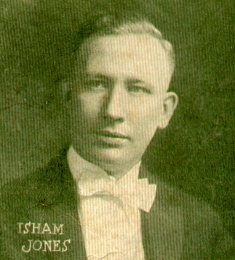
Isham Edgar Jones was an American bandleader, saxophonist, bassist and songwriter.

Lemeul Eugene Lucas, better known by his stage name Gene Austin, was an American singer and songwriter, one of the early "crooners". His recording of "My Blue Heaven" sold over 5 million copies and was for a while the largest selling record of all time. His 1920s compositions "When My Sugar Walks Down the Street" and "The Lonesome Road" became pop and jazz standards.
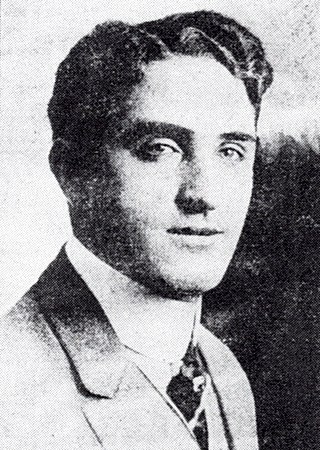
Louis Wolfe Gilbert was a Russian-born American songwriter of Tin Pan Alley. He is best remembered as the lyricist for "Ramona" (1928), the first movie theme song ever written.

Carmen Lombardo was lead saxophonist and featured vocalist for his brother Guy Lombardo's orchestra. He was also a successful composer. In 1927, Carmen Lombardo was the vocalist of the hit record Charmaine, performed by Guy Lombardo and His Royal Canadians.

"Singin' in the Rain" is a song with lyrics by Arthur Freed and music by Nacio Herb Brown. Doris Eaton Travis introduced the song on Broadway in The Hollywood Music Box Revue in 1929. It was then widely popularized by Cliff Edwards and the Brox Sisters in The Hollywood Revue of 1929. Many contemporary artists have since recorded the song.

"Back in Your Own Back Yard" is a popular song. Officially the credits show it as written by Al Jolson, Billy Rose, and Dave Dreyer; in fact, Billy Rose was exclusively a lyricist, Dreyer a composer, and Al Jolson a performer who was often given credits so he could earn some more money, so the actual apportionment of the credits would be likely to be music by Dreyer, lyrics by Rose, and possibly some small contribution by Jolson.

"Side by Side" is a popular song by Harry M. Woods written in 1927, and is now considered a standard.
"My Baby Just Cares for Me" is a jazz standard written by Walter Donaldson with lyrics by Gus Kahn. Written for the film version of the musical comedy Whoopee! (1930), the song became a signature tune for Eddie Cantor who sang it in the movie. A stylized version of the song by American singer and songwriter Nina Simone, recorded in 1957, was a top 10 hit in the United Kingdom after it was used in a 1987 perfume commercial and resulted in a renaissance for Simone.
"Heat Wave" is a popular song written by Irving Berlin for the 1933 musical As Thousands Cheer, and introduced in the show by Ethel Waters.

"My Buddy" is a popular song with music written by Walter Donaldson, and lyrics by Gus Kahn. The song was published in 1922 and early popular versions were by Henry Burr (1922), Ernest Hare (1923) and Ben Bernie.
"This Can't Be Love" is a show tune and a popular song from the 1938 Rodgers and Hart musical The Boys from Syracuse when it was sung by Eddie Albert and Marcy Westcott. The lyrics poke fun at the common depiction of love in popular songs as a host of malignant symptoms, saying, "This can't be love because I feel so well."

"My Melancholy Baby" is a popular song published in 1912 and first sung publicly by William Frawley. The music was written by Ernie Burnett (1884–1959), the lyrics by George A. Norton.
"I've Got a Crush on You" is a song composed by George Gershwin, with lyrics by Ira Gershwin. It is unique among Gershwin compositions in that it was used for two different Broadway productions: Treasure Girl (1928), when it was introduced by Clifton Webb and Mary Hay, and Strike Up the Band (1930), when it was sung by Doris Carson and Gordon Smith. It was later included in the tribute musical Nice Work If You Can Get It (2012), in which it was sung by Jennifer Laura Thompson. When covered by Frank Sinatra he was a part of Columbia Records.
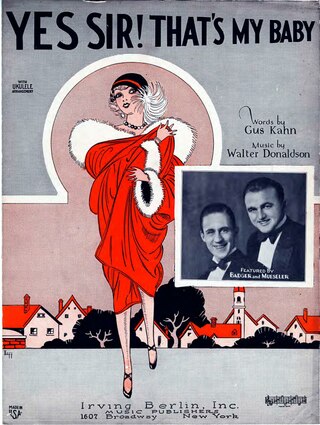
"Yes Sir, That's My Baby" is a popular U.S. song from 1925. The music was written by Walter Donaldson and the lyrics by Gus Kahn. It is now in the public domain.
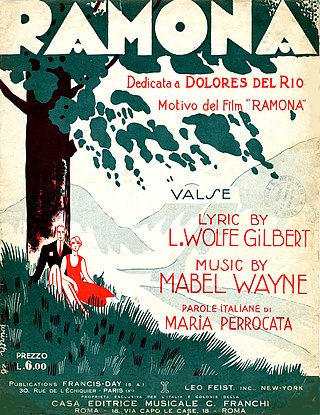
"Ramona" is a 1928 song with lyrics by L. Wolfe Gilbert and music by Mabel Wayne. Composed for the 1928 feature film Ramona, it was the first theme song written for the movies.
"The Lonesome Road" is a 1927 song with music by Nathaniel Shilkret and lyrics by Gene Austin, alternately titled "Lonesome Road", "Look Down that Lonesome Road" and "Lonesome Road Blues." It was written in the style of an African American folk song.
"Softly, as in a Morning Sunrise" is a song with music by Sigmund Romberg and lyrics by Oscar Hammerstein II from the 1928 operetta The New Moon. One of the best-known numbers from the show, it is a song of bitterness and yearning for a lost love, sung in the show by Philippe (tenor), the best friend of the hero, Robert Mission (baritone).
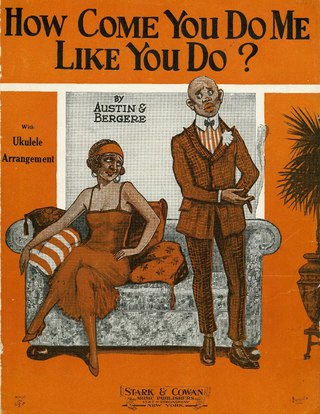
"How Come You Do Me Like You Do?" is a song written by vaudeville comedy duo Gene Austin and Roy Bergere in 1924. It has later been covered by many artists, and is considered a jazz standard.
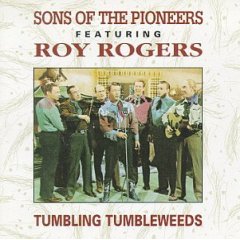
"Tumbling Tumbleweeds" is a Western music song composed by Bob Nolan, a founding member of the Sons of the Pioneers. Nolan wrote the song in the early 1930s while he was working as a caddy and living in Los Angeles. It was first recorded by the Sons of the Pioneers in 1934, and it became one of the most famous songs associated with the group. Originally titled "Tumbling Leaves", the song was reworked into the title "Tumbling Tumbleweeds" and into more widespread fame with the 1935 film of the same name starring Gene Autry. Members of the Western Writers of America chose it as one of the Top 100 Western songs of all time.
"When My Sugar Walks Down the Street " is a 1920s jazz standard, written by Gene Austin, Jimmy McHugh and Irving Mills in 1924.














